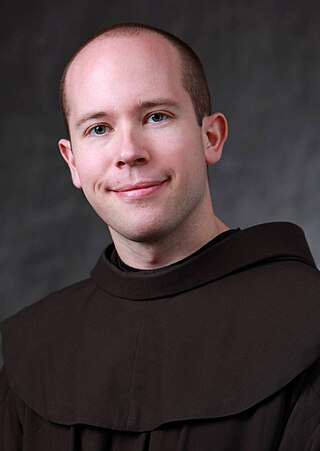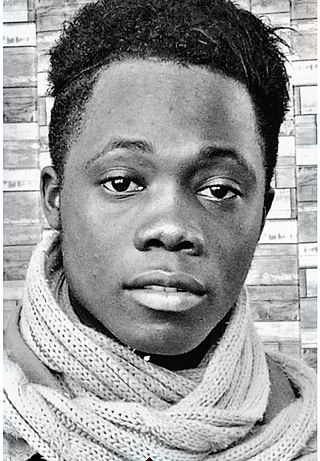Related Research Articles
Feminist theology is a movement found in several religions, including Buddhism, Hinduism, Sikhism, Neopaganism, Baháʼí Faith, Judaism, Islam, Christianity and New Thought, to reconsider the traditions, practices, scriptures, and theologies of those religions from a feminist perspective. Some of the goals of feminist theology include increasing the role of women among clergy and religious authorities, reinterpreting patriarchal (male-dominated) imagery and language about God, determining women's place in relation to career and motherhood, studying images of women in the religions' sacred texts, and matriarchal religion.

A goddess is a female deity. In many known cultures, goddesses are often linked with literal or metaphorical pregnancy or imagined feminine roles associated with how women and girls are perceived or expected to behave. This includes themes of spinning, weaving, beauty, love, sexuality, motherhood, domesticity, creativity, and fertility. Many major goddesses are also associated with magic, war, strategy, hunting, farming, wisdom, fate, earth, sky, power, laws, justice, and more. Some themes, such as discord or disease, which are considered negative within their cultural contexts also are found associated with some goddesses. There are as many differently described and understood goddesses as there are male, shapeshifting, or neuter gods.

In Hinduism, kundalini is a form of divine feminine energy believed to be located at the base of the spine, in the muladhara. It is an important concept in Śhaiva Tantra, where it is believed to be a force or power associated with the divine feminine or the formless aspect of the Goddess. This energy in the body, when cultivated and awakened through tantric practice, is believed to lead to spiritual liberation. Kuṇḍalinī is associated with the goddess Parvati or Adi Parashakti, the supreme being in Shaktism, and with the goddesses Bhairavi and Kubjika. The term, along with practices associated with it, was adopted into Hatha Yoga in the 9th century. It has since then been adopted into other forms of Hinduism as well as modern spirituality and New Age thought.
Meditation is a practice in which an individual uses a technique to train attention and awareness and detach from reflexive, "discursive thinking," achieving a mentally clear and emotionally calm and stable state, while not judging the meditation process itself.

Unity is a historically Christian liberal spiritual organization founded by Charles and Myrtle Fillmore in 1889. It grew out of Transcendentalism and became part of the New Thought movement. Unity may be best known for its Daily Word devotional publication begun in 1924. Originally based in Christianity with emphasis on the Bible, Unity has said it is a "Christian movement that emphasizes affirmative prayer and education as a path to spirituality," and says about itself, "We honor all spiritual practices and the diversity of paths leading to enlightenment."

Kundalini yoga derives from kundalini, defined in tantra as energy that lies within the body, frequently at the navel or the base of the spine. In normative tantric systems, kundalini is considered to be dormant until it is activated and channeled upward through the central channel in a process of spiritual perfection. Other schools, such as Kashmir Shaivism, teach that there are multiple kundalini energies in different parts of the body which are active and do not require awakening. Kundalini is believed by adherents to be power associated with the divine feminine, Shakti. Kundalini yoga as a school of yoga is influenced by Shaktism and Tantra schools of Hinduism. It derives its name through a focus on awakening kundalini energy through regular practice of mantra, tantra, yantra, yoga, laya, haṭha, meditation, or even spontaneously (sahaja).

Martin Buber was an Austrian-Israeli philosopher best known for his philosophy of dialogue, a form of existentialism centered on the distinction between the I–Thou relationship and the I–It relationship. Born in Vienna, Buber came from a family of observant Jews, but broke with Jewish custom to pursue secular studies in philosophy. He produced writings about Zionism and worked with various bodies within the Zionist movement extensively over a nearly 50-year period spanning his time in Europe and the Near East. In 1923, Buber wrote his famous essay on existence, Ich und Du, and in 1925 he began translating the Hebrew Bible into the German language.
A religious experience is a subjective experience which is interpreted within a religious framework. The concept originated in the 19th century, as a defense against the growing rationalism of Western society. William James popularised the concept. In some religions, this is said to sometimes result in unverified personal gnosis.
The gender of God can be viewed as a literal or as an allegorical aspect of a deity.
The Spiritual Counterfeits Project (SCP) is a Christian evangelical parachurch organization located in Pasadena, California. Since its inception in the early 1970s, it has been involved in the fields of Christian apologetics and the Christian counter-cult movement. Its current president is Dr. Mark J Harris. In its role as a think tank, SCP has sought to publish evangelically based analyses of new religious movements, New Age movements, and alternative spiritualities in light of broad cultural trends. SCP has also been at the center of two controversial U.S. lawsuits, one involving church-state issues and the other being a religious defamation case. It published the SCP Journal and Newsletter.
Christian feminism is a school of Christian theology which uses the viewpoint of a Christian to promote and understand morally, socially, and spiritually the equality of men and women. Christian theologians argue that contributions by women and acknowledging women's value are necessary for a complete understanding of Christianity. Christian feminists are driven by the belief that God does not discriminate on the basis of biologically determined characteristics such as sex and race, but created all humans to exist in harmony and equality regardless of those factors. On the other hand, Christian egalitarianism is used for those advocating gender equality and equity among Christians but do not wish to associate themselves with the feminist movement.
James Edwin Orr was an Irish-born American Baptist Christian minister, hymnwriter, professor, author and promoter of church revival and renewal.
Free grace theology is a Christian soteriological view which holds that the only condition of salvation is faith, excluding good works and perseverance, holding to eternal security. Free grace advocates believe that good works are not necessary to merit, to maintain or to prove salvation, but rather are part of discipleship and the basis for receiving eternal rewards. This soteriological view distinguishes between salvation and discipleship – the call to believe in Christ as Savior and to receive the gift of eternal life, and the call to follow Christ and become an obedient disciple, respectively. Free grace theologians emphasize the absolute freeness of salvation and the possibility of full assurance that is not grounded upon personal performance. Norman Geisler has divided this view into a moderate form and a more radical form. The moderate form being associated with Charles Ryrie and the strong form with Zane Hodges.

Daniel Patrick Horan is an American Franciscan friar, Catholic priest, theologian, and author. He is currently the director of the Center for the Study of Spirituality and professor of Philosophy, Religious Studies, and Theology at Saint Mary's College in Notre Dame, Indiana. He is also affiliated Professor of Spirituality at the Oblate School of Theology in San Antonio, Texas. He previously held the Duns Scotus Chair of Spirituality at Catholic Theological Union in Chicago, and taught at several other academic institutions. He is a columnist for National Catholic Reporter.
Benjamin Myers is an Australian theologian at Alphacrucis University College, and a research fellow of the Centre for Public and Contextual Theology at Charles Sturt University. From 2009 to 2017 Myers was a lecturer at United Theological College within the School of Theology of Charles Sturt University. Prior to taking up a post at CSU, Myers was a researcher at the University of Queensland's Centre for the History of European Discourses. He has also been a member of Princeton's Center of Theological Inquiry and a visiting scholar at Fuller Theological Seminary.
Ched Myers is an American theologian specializing in biblical studies and political theology.
David Gordon Benner is a Canadian depth psychologist, author and wisdom teacher.
Arnold Genekowitsch Fruchtenbaum is a Russian-born American theologian. He is a leading expert in Messianic Judaic theology and the founder and director of Ariel Ministries, an organization which prioritizes the evangelization of Jews in an effort to bring them to the view that Jesus is the Jewish Messiah. He lectures and travels widely.
Elizabeta Dimitrova, is a Macedonian art historian, Byzantinist and professor.

Joseph Marwa also recognized by his pen name Josephs Quartzy is a Tanzanian television actor, novelist and a former lead vocalist for the music duo The Eastern Bandits.
References
- 1 2 "Dr Irene Alexander (Keynote)". CCAA. Retrieved 2023-08-10.
- ↑ "Dancing with God". spckpublishing.co.uk. Retrieved 2023-08-10.
- ↑ "Irene Alexander – Australian Ecumenical Council for Spiritual Direction". spiritualdirection.org.au. Retrieved 2023-08-10.
- ↑ "To whom shall we go : faith responses in a time of crisis | WorldCat.org". www.worldcat.org. Retrieved 2023-08-10.
- ↑ "Awakening desire : encountering the divine feminine in the masculine Christian journey | WorldCat.org". www.worldcat.org. Retrieved 2023-08-10.
- ↑ "Glimpse of the kingdom in academia : academic formation as radical discipleship | WorldCat.org". www.worldcat.org. Retrieved 2023-08-10.
- ↑ "Practicing the presence of Jesus : contemporary meditation | WorldCat.org". www.worldcat.org. Retrieved 2023-08-10.
- ↑ "Interweavings : Conversations between narrative therapy and Christian faith | WorldCat.org". www.worldcat.org. Retrieved 2023-08-10.